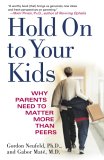Summary | Excerpt | Reviews | Beyond the book | Read-Alikes | Genres & Themes | Author Bio

The High Cost of Invasive Parenting
by Hara Estroff MaranoParents of babies, toddlers, school age children and
teenagers will find much in this book to provoke, irritate, and clarify the
tough and often perplexing work of raising and educating 21st century kids.
Marano, even when she fails to persuade, makes us think hard about what parents
should expect from their children and what kids need to become strong, happy,
and healthy young adults.
If I weren't the seasoned parent of two teenagers, I wonder how I'd feel about
having children after reading this daunting but interesting and ultimately
hopeful book. Marano, aiming to create as much drama as she can muster, begins
by sounding the alarm on a "national crisis" of heavy-handed, selfish parenting
and the generation of cowardly, inauthentic, depressed, numb and/or
self-destructive young adults it's produced. In a series of sometimes strident
arguments presented under catchy chapter headings ("We're All Jewish Mothers
Now," "Cheating Childhood," "Meet Mom and Dad, the New Hall Monitors," "Crisis
on Campus," and "Arrested Development") Marano presents loads of
data from an array of psychological, physiological, neurological and psychiatric
studies, as well as anecdotes from teachers, pediatricians, college
administrators, educators, and even children themselves, to prove her thesis that misguided,
cowardly, controlling, and overambitious parents are crippling kids and ruining
their chances for happiness or competence.
Marano seems shrill when she presents case after case of messed-up children and
phobic, narcissistic, and competitive parents. One haunting example of toxic
academic overachievement is the Ivy League college student so numbed by a
lifetime of academic pressure that attempted suicide is her only way to discover
who she really is and what she really wants, or the smothering young mother
unable to spend time away from her four year old daughter, even for a few hours. Marano scorns moms who tuck those little bottles of antibacterial gel in their
kids' lunchboxes (I plead guilty to this one. Am I crazy? Have I made my
daughters feel that the world is a dangerous and scary place?), and scoffs at
overzealous mothers who protect their toddlers from shopping cart germs with
cloth liners (I admit that I might have done this, too, if these had been
available.).
Marano says little about her own parenting style, but includes a few details
about her two sons, one of whom grew up with a life-threatening peanut allergy.
She insists that children absolutely need time away from their parents in order
to learn how to calm and reassure themselves, and, most importantly, in order to
learn how to take care of themselves. She is skeptical about the value of
stay-at-home mothering and thinks that the women who've sacrificed a career for
the job of parenting have made a mistake that will hurt not only their children
but their marriages.
Critical of the almost umbilical cell phone connection between kids and parents,
and highly skeptical of attachment parenting, Marano heartily approves of
daycare, babysitters, and sleepway camps. There is nothing for these worried
parents to fear, she asserts, from germs, childhood solitude or exploration
(including playing "doctor"), and reminds the reader that the likelihood of
stranger abduction or molestation is almost nil.
The saddest sections of the book are also the most persuasive and concern the
exuberant, brave, elastic and exploratory ways children learn, and the
increasingly rigorous and unforgiving expectations that burden school-age
children. Marano explains why boredom, failure and fidgeting are healthy and
often necessary; and that kids need to fail in order to learn or to succeed. She
points out the dangerous lack of physical activity or expression in many
American schools and the frightening pathologizing of perfectly normal childhood
behaviors.
I was a college student in the late sixties and early seventies, and a
university instructor in the late seventies and early eighties, and suspect
Marano exaggerates the "crisis" of drinking and mental illness on college
campuses today (Mightn't more thorough and transparent reporting skew current
numbers?). But Marano is sensible when she notes that almost constant cell phone
use damages our ability to live in the present or to connect to strangers. I was
disappointed that she says little about this generation's addiction to
communication via Facebook and its effect on young people's ability to
socialize.
Despite the careful accumulation of evidence, Marano is most powerful when she
demonstrates what works for children rather than what doesn't. Her chapter on
Sudbury Valley School, a school where learning is completely student-directed,
was especially inspiring and reassuring: Marano reminds parents that their
children are brave explorers who will welcome responsibility and embrace life's
challenges and adventures -- if we let them.
![]() This review
first ran in the May 2, 2008
issue of BookBrowse Recommends.
This review
first ran in the May 2, 2008
issue of BookBrowse Recommends.

If you liked A Nation of Wimps, try these:

by Rosalind Wiseman, Elizabeth Rapoport
Published 2007
Essential reading for parents today. Offering us the tools to become wiser, more relaxed parents – and the inspiration to speak out, act according to our values, show humility, and set the kind of example that will make a real difference in our children's lives.

by Gordon Neufeld, Gabor Maté
Published 2006
The concepts, principles and practical advice contained in Hold On to Your Kids will empower parents to satisfy their children’s inborn need to find direction by turning towards a source of authority, contact and warmth.
If every country had to write a book about elephants...
Click Here to find out who said this, as well as discovering other famous literary quotes!
Your guide toexceptional books
BookBrowse seeks out and recommends the best in contemporary fiction and nonfiction—books that not only engage and entertain but also deepen our understanding of ourselves and the world around us.